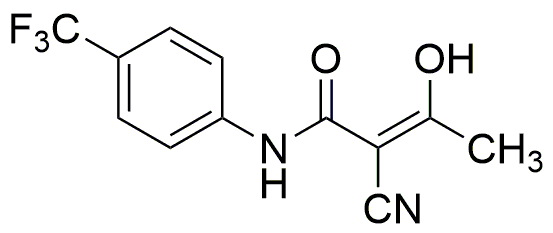Teriflunomide is widely utilized in research focused on
- Multiple Sclerosis Treatment: This compound is primarily used as an oral medication for treating relapsing forms of multiple sclerosis (MS), helping to reduce the frequency of relapses and slow disease progression.
- Immunomodulation: Teriflunomide works by modulating the immune system, making it beneficial for researchers studying autoimmune diseases and developing new therapies.
- Pharmaceutical Development: Its unique mechanism of action provides a valuable model for pharmaceutical companies looking to create new immunosuppressive drugs with fewer side effects compared to traditional therapies.
- Research in Cancer Therapy: Investigations are ongoing into its potential applications in oncology, particularly in enhancing the efficacy of certain cancer treatments through immune system modulation.
- Comparative Effectiveness Studies: Researchers are using teriflunomide in clinical trials to compare its effectiveness and safety profile against other MS treatments, providing crucial data for healthcare providers.
Informations générales
Propriétés
Sécurité et réglementation
Applications
Teriflunomide is widely utilized in research focused on
- Multiple Sclerosis Treatment: This compound is primarily used as an oral medication for treating relapsing forms of multiple sclerosis (MS), helping to reduce the frequency of relapses and slow disease progression.
- Immunomodulation: Teriflunomide works by modulating the immune system, making it beneficial for researchers studying autoimmune diseases and developing new therapies.
- Pharmaceutical Development: Its unique mechanism of action provides a valuable model for pharmaceutical companies looking to create new immunosuppressive drugs with fewer side effects compared to traditional therapies.
- Research in Cancer Therapy: Investigations are ongoing into its potential applications in oncology, particularly in enhancing the efficacy of certain cancer treatments through immune system modulation.
- Comparative Effectiveness Studies: Researchers are using teriflunomide in clinical trials to compare its effectiveness and safety profile against other MS treatments, providing crucial data for healthcare providers.
Documents
Fiches de données de sécurité (FDS)
La FDS fournit des informations de sécurité complètes sur la manipulation, le stockage et l’élimination du produit.
Spécifications du produit (PS)
Le PS fournit une description complète des propriétés du produit, notamment sa composition chimique, son état physique, sa pureté et les exigences de stockage. Il détaille également les plages de qualité acceptables et les applications prévues du produit.
Certificats d'analyse (COA)
Recherchez des certificats d'analyse (COA) en saisissant le numéro de lot du produit. Les numéros de lot et de lot se trouvent sur l'étiquette d'un produit, après les mots « Lot » ou « Lot de fabrication ».
Numéro de catalogue
Numéro de lot/série
Certificats d'origine (COO)
Ce certificat d'exploitation confirme le pays dans lequel le produit a été fabriqué, et détaille également les matériaux et composants utilisés et s'il est issu de sources naturelles, synthétiques ou autres sources spécifiques. Ce certificat peut être requis pour les douanes, le commerce et la conformité réglementaire.
Numéro de catalogue
Numéro de lot/série
Fiches de données de sécurité (FDS)
La FDS fournit des informations de sécurité complètes sur la manipulation, le stockage et l’élimination du produit.
DownloadSpécifications du produit (PS)
Le PS fournit une description complète des propriétés du produit, notamment sa composition chimique, son état physique, sa pureté et les exigences de stockage. Il détaille également les plages de qualité acceptables et les applications prévues du produit.
DownloadCertificats d'analyse (COA)
Recherchez des certificats d'analyse (COA) en saisissant le numéro de lot du produit. Les numéros de lot et de lot se trouvent sur l'étiquette d'un produit, après les mots « Lot » ou « Lot de fabrication ».
Numéro de catalogue
Numéro de lot/série
Certificats d'origine (COO)
Ce certificat d'exploitation confirme le pays dans lequel le produit a été fabriqué, et détaille également les matériaux et composants utilisés et s'il est issu de sources naturelles, synthétiques ou autres sources spécifiques. Ce certificat peut être requis pour les douanes, le commerce et la conformité réglementaire.

